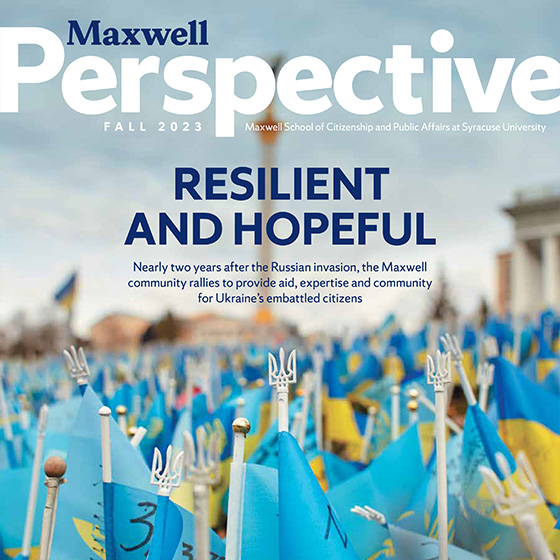Maxwell alumni and counting!
undergraduate alumni
graduate alumni

Celebrating Maxwell's 100 Years
Alumni, students, faculty and friends gathered in Washington, D.C. to celebrate the Maxwell School’s 100th anniversary on May 31, 2024 with the Centennial Awards and Awards of Excellence.
Our Greatest Asset Is You
Maxwell Perspective Online
Enjoy Maxwell Perspective magazine your way, both in print and online. Either way, you can expect the same great content accessible anytime:
- News and feature stories about our accomplished and inspiring alumni community.
- Digital Class Notes, regularly updated with the latest from the Maxwell global community.
- Plus, upcoming events and ways to connect.

State of Democracy Lecture: Aliya Saperstein
Maxwell Auditorium
Add to: Outlook, ICal, Google Calendar
Racial Mobility: The Dynamics of Race and Inequality in the United States
What is it that you know when you know someone’s race? Discussing the specifics makes many Americans uncomfortable, and there is little agreement on what researchers are trying to measure – skin color, ancestry, geography, culture, identity – with those race boxes we regularly ask people to check on forms and in surveys. Nevertheless, most studies of inequality in the United States assume that a person’s race is an input into our stratification system: a static, individual attribute that is ascribed at birth and helps to explain who accrues advantages or disadvantages throughout life. Professor Saperstein’s work demonstrates instead that race is both multi-dimensional and malleable: how Americans see racial difference has been shaped by centuries of discrimination and inequality, so a person’s race does not simply pre-date their upward or downward mobility; how we perceive each other and identify ourselves is also a result of those experiences. This “racial mobility” represents a vicious cycle between racial categorization and inequality that has important implications for both data collection and public policy.
Aliya Saperstein is an assistant professor of sociology at
Stanford University whose research focuses on the conceptualization and
measurement of race/ethnicity and sex/gender, and their consequences for
understanding social inequality. Her work has earned recognition from academic
journals, research centers, and professional associations in sociology and
demography, including the 2016 Early Achievement Award from the Population
Association of America. Saperstein, a former Visiting Scholar at the Russell Sage
Foundation, is currently completing a book manuscript on Racial Mobility.
This lecture is made possible through a generous gift from the Norman M. and Marsha Lee Berkman fund.
Region
Campus
Open to
Public
Contact
Accessibility
Contact to request accommodations
Your Network in Action
School News

Jun 20, 2024
School News

Jun 20, 2024
School News

Jun 18, 2024
Only 10% To Go!
With incredible support, our campaign is going strong. But to meet our campaign goals, we will need to raise the remaining 10% by December 31, 2024 to support campaign priorities from the school’s long-range strategic plan.
